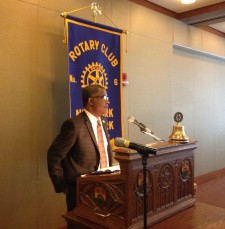 29 April, 2013
29 April, 2013
NEW YORK, New York. – The founder and CEO of the Batey Relief Alliance Dominicana, Ulrick Gaillard, joins the rank of Dominican personality, investigative journalist and television producer Nuria Piera, to receive from the Rotary Club of New York Rotary International’s prestigious honor—Paul Harris award. The ceremony was held on April 29, 2013 at the Harvard Club in New York City.
For sixteen years, Gaillard worked tirelessly to engage the Dominican authority, international community and local groups in dialogues and to address one of the Dominican Republic’s most controversial and highly sensitive issues—the questionable conditions of hundreds of thousands of disenfranchised and undocumented Haitian workers and their Dominican descendants languishing inside the country’s sugarcane plantations rural communities known as “bateyes”. “Despite their size and critical role in the Dominican economy, the batey populations are vulnerable and severely affected by extreme poverty, diseases and hunger – and suffer inordinately from economic isolation, healthcare disparity and government neglect,” said Gaillard.
While Gaillard applauds the efforts made by the country to work closely with the Batey Relief Alliance, through strategic partnerships with the international community and local groups, to improve the ills that persist within those bateyes, such as high rates of HIV/AIDS and Tuberculosis, malnutrition, fertility and infant mortality, and unemployment; the lack of basic services; and the non-legal status of the populations, he warns that unless a true political will emerges to reverse the status-quo, the situation could become more difficult to manage – and turn into a severe humanitarian crisis. “When neither the parents nor the children are legally documented, they forcibly become invisible under the country’s radar hindering them from going to school, receiving social security benefits, holding a bank account or obtaining formal employment – they exist within a system that could practically cripple their growth,” added Gaillard.
More than 1 million undocumented foreigners live and work in the Dominican Republic. A vast majority are impoverished Haitians and their Dominican descendants—accounting for anywhere between 7-12% of the total Dominican population. Through partnerships with the US Agency for International Development (USAID), US Department of Agriculture (USDA), UN High Commissioner for Refugees (UNHCR), the Dominican government and international aid groups, BRA secured more than $70 million to carry out its humanitarian mission in the province of Monte Plata by installing modern medical centers and HIV/AIDS Prevention and Treatment Units; and running community development programs of food security and cooperative agriculture, women empowerment, microcredit, deworming/multivitamins, water/sanitations, education and disaster relief, servicing more than 100,000 people annually in those bateyes. In 2010, BRA expanded its work into the border regions of Haiti.
Ulrick Gaillard is a United States-trained attorney with professional backgrounds in political science and government and pursued Leadership Studies at the Harvard University JFK School of Government. After collaborating in 2005 with the Clinton Foundation HIV-AIDS Initiative to develop the first HIV-AIDS ARV treatment program for people living with HIV-AIDS/Tuberculosis in the bateyes, President Bill Clinton invited Gaillard in 2011 to join membership with the Clinton Global Initiative (CGI).
To learn more about BRA’s work, like on Facebook at http://www.facebook.com/Batey.Relief.Alliance; follow on Twitter at http://twitter.com/bateyrelief; and visit www.bateyrelief.org.